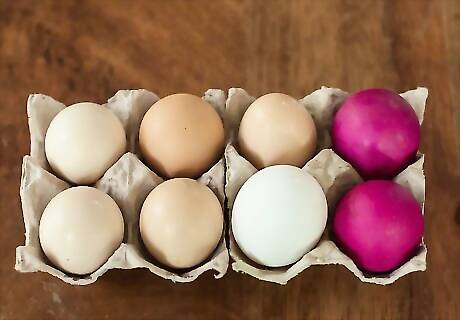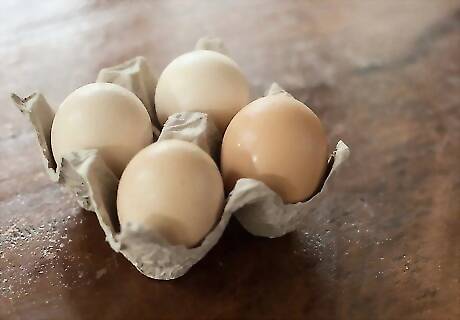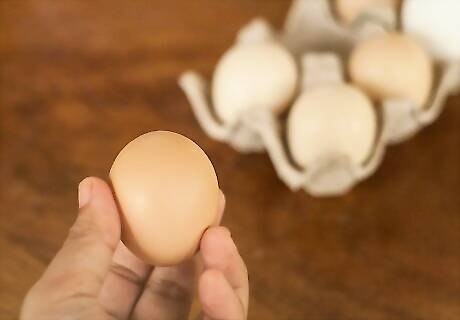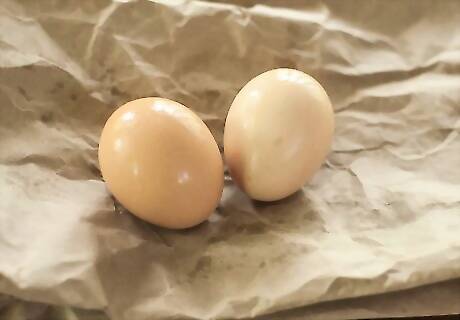
views
Types of Eggs

Understand how conventional eggs are produced. Conventional eggs often come from hens that have been kept in small cages in crowded facilities. Also, conventional eggs often come from hens that have eaten a diet of corn, soy and cottonseed meal, which is then filled with commercial additives. Conventional eggs are safe to eat and still make a good choice of protein. However, many researchers believe that eggs from chickens raised in these conditions are nutritionally inferior.

Know what organic means. Eggs labeled “organic” by the USDA come from chickens that are kept cage-free with outdoor access. These chickens have not had antibiotics and eat a diet free of animal by-products. In addition, the hens’ diets cannot contain crops grown with chemical pesticides, fertilizers, irradiation, genetic engineering or sewage sludge.

Consider purchasing free-range eggs. Hens that are “free-range” are not only cage-free but are also given access to the outdoors. However, free-range does not necessarily mean that the hens were pastured; it simply means that the hens had the option to go outside. To ensure that you eat truly free-range eggs, purchase eggs from pastured hens. Pastured hens often eat diets that include greens, seeds, worms and bugs, which are more akin to a natural chicken’s diet. Studies have shown that eggs from pastured hens may have more omega-3 fatty acids, more vitamins and less fat and cholesterol.

Choose omega-3 enriched eggs for heart health. Omega-3 enriched eggs come from hens that were fed a diet rich in omega-3 sources, like flaxseed or algae. Consequently, their eggs are richer in omega-3 fatty acids. Omega-3’s are thought to promote a healthier nervous system as well as a healthier cardiovascular system.

Be aware of hormone and antibiotic use. The USDA forbids the use of hormones for egg production. Also, the use of therapeutic antibiotics is forbidden unless hens are ill. However, the only way to ensure that the hens that laid the eggs were antibiotic-free is to purchase organic eggs.

Be wary of unregulated labels. Terms like “natural” and “cage-free” are often used in labeling, but these claims may not necessarily be true. Claims on eggs with the USDA shield have been verified by the Department of Agriculture, so always look for the shield when you purchase eggs from a store.
Purchasing Eggs from the Store

Always purchase eggs from refrigerated cases. Generally, eggs are transported to stores in vehicles in which the ambient temperature doesn’t exceed 45°F (7°C). Keeping eggs refrigerated helps to prevent foodborne illness like salmonella.

Choose eggs with clean, uncracked shells. Take the time to open an egg carton and inspect the eggs for cracks or breakage. Salmonella tends to live on the exterior of the eggshell and can travel into the interior via cracks.

Avoid buying out-of-date eggs. Over time, the yolk begins to absorb water from the egg white. The egg white becomes thinner, losing some of its thickening and leavening abilities, and the yolk becomes flatter, larger and more easily broken. Eggs may be kept in your refrigerator for 3 to 5 weeks after you bring them home from the store, even if the sell-by date passes during that time.

Look for the USDA-grade shield or mark. A shield bearing the USDA grade of the egg means that the egg has been examined and certified to meet strict quality standards. These eggs have not been previously packed and shipped, and they have not been doused in non-USDA-approved cleansers. USDA-grade eggs are coded to identify both the location where the eggs were packed and the day of the year when the eggs were packed.

Choose the appropriate grade. Grade AA eggs have thick, firm whites and high, round yolks. This grade of egg is virtually free of defects and is best for frying, poaching or other cooking applications where the appearance of the egg matters. However, most stores sell Grade A eggs. These eggs are the same quality as Grade AA except that the white is categorized as “reasonably” firm. Grade-B eggs are seldom found in retail stores because they are used to make liquid, frozen and dried egg products.

Select the most useful and economical size. The sizing of eggs is determined by their weight, not by their dimensions. Many recipes are very specific about the size of egg that should be used, particularly in baking. Large eggs are best for most applications.
Purchasing Eggs from Farmers

Choose certified organic eggs. Farms selling eggs that have earned the certified organic label are visited annually by an Organic Program Food Inspector, which ensures their quality. Also, certified organic eggs must come from chickens that have been fed organic feed, kept in humane living conditions and kept free from antibiotics or hormones. Many farmers may call their eggs “organic,” but certification is the only way to know for sure.

Select medium or small eggs. These eggs tend to have thicker shells than large eggs and are less likely to become contaminated by bacteria.

Nesting hens should be kept in a fenced area. If hens are allowed to nest anywhere they choose, then farmers will have no idea how old the eggs are or with what they have been in contact. Also, nest litter should be kept clean and dry and changed frequently.

Eggs should be collected before 10:00 a.m. and preferably twice per day. The longer an egg remains in the nest, the more likely the egg will become dirty, broken or lose interior quality.

Eggs should be stored large end up at a temperature between 50 and 55°F (10 and 13°C). The relative humidity in the room should be about 75 percent.

Bring your own carton in which to carry eggs home. Recycling a previously used egg carton is not recommended, and it is illegal in many places for farmers to sell eggs in a carton bearing the name of another farm.

Finished.




















Comments
0 comment